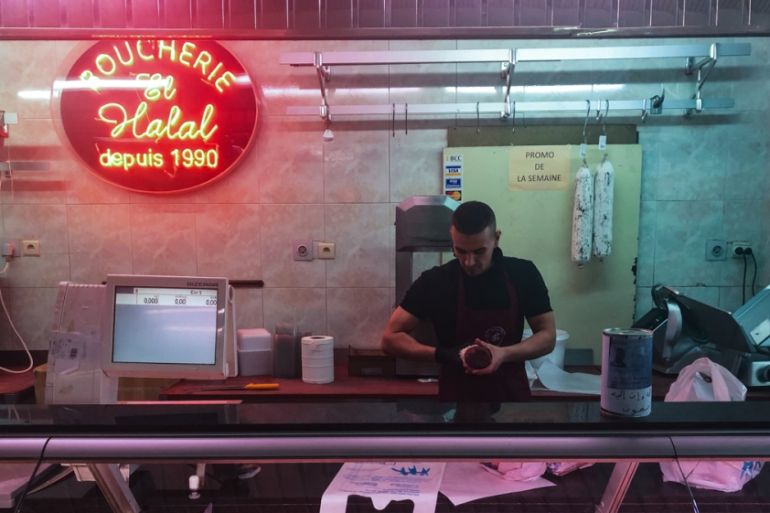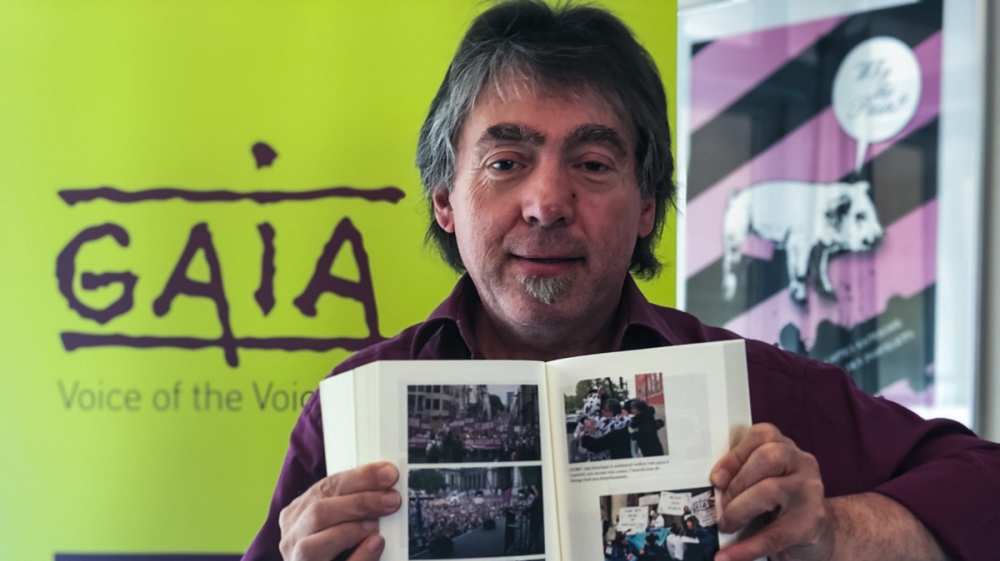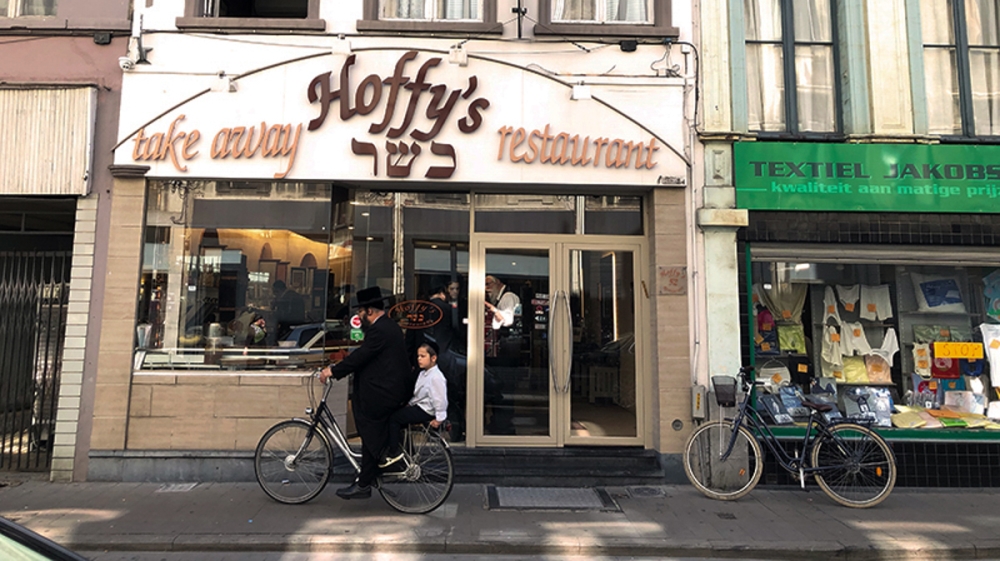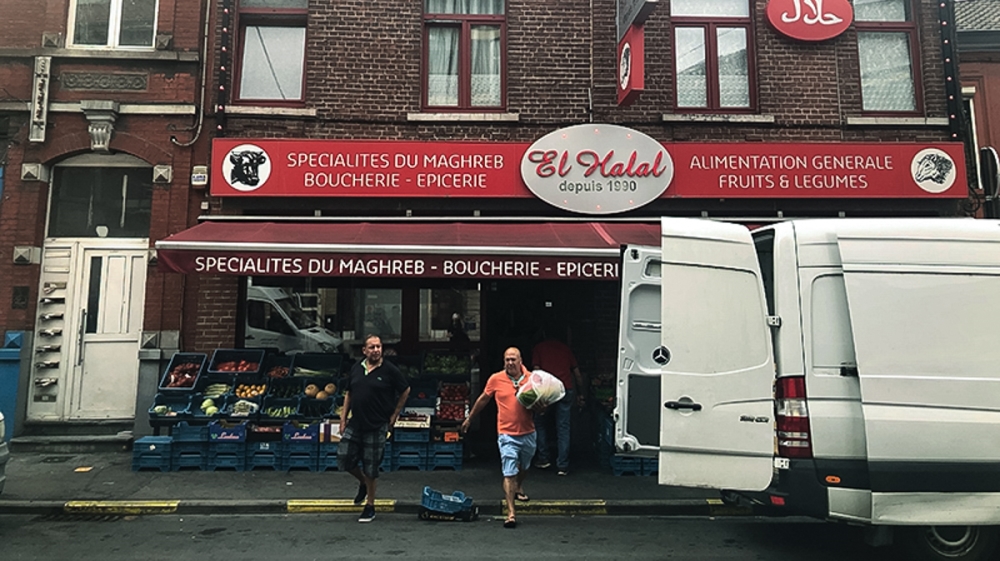Animal slaughter ruling in Belgium stirs religious freedom debate
New law says animals must be stunned before slaughter, winning activists’ support but upsetting Jews and Muslims.

Brussels and Wallonia, Belgium – Inside his Brussels office, animal rights activist Michel Vandenbosch opens a large book he wrote about the Global Action in the Interest of Animals, or GAIA, Belgium’s leading animal rights organisation.
Vandenbosch, its president, points to photos of a 2014 rally in Belgium’s capital, attended by thousands of people calling for a national ban on slaughtering animals such as cattle, sheep and goats without stunning them first.
Keep reading
list of 4 itemsThe surfer chef behind South Africa’s first fine dining halal restaurant
Why are Pakistan’s wheat farmers protesting against the government?
About 282 million people faced acute hunger last year: UN-led report
“When you cut an animal’s throat, without stunning, it still feels pain,” said Vandenbosch.
GAIA produced a video showing animals contorting after a knife cuts the blood vessels in the neck.
“If you take the scientific evidence really seriously, then these kinds of habits should change.”
On September 1, Vandenbosch and fellow supporters of the ban claimed a victory when the second such law went into effect in Belgium.
It first went into effect in Flanders – the northern, mostly Dutch-speaking region – in January. Now, the law must be respected in the southern, mostly French-speaking region, called Wallonia. Flanders and Wallonia are Belgium’s two largest regions.
We think we are a part of Belgium people, we feel Belgian, and these kinds of things show us that we are not accepted by the Belgian community.
Back in 2017, Wallonia’s parliament voted nearly unanimously in favour of the ban – just three members abstained.
Only Brussels, Belgium’s third region, has not imposed the ban.
Belgium has three animal welfare ministers for each of its regions – Flanders, Brussels and Wallonia.
Some claim the bans are discriminatory, but Vandenbosch rejects framing them as a target on Muslims or Jews.
“It does not apply only to members of religious communities,” he said. “It does apply to each and every single Belgian citizen period, whatever his religious beliefs may be.”
He explains his organisation took on the cause around 1995, when Belgium’s far right began pushing for a religious slaughter ban.
Activists like him feared that the far right had tinged the issue with Islamophobia.
“This would have meant a taboo on the whole issue,” he said, so GAIA focused it on animal wellbeing.
But many Muslims and Jews in Belgium say they are outraged because, according to their religious laws, animals must be in perfect health before slaughter.
To them, the options for stunning – making animals unconscious – mean harming an animal before slaughter, which is forbidden.
They say cutting the throat causes the least amount of pain for animals.
A number of Muslim and Jewish groups filed a petition with Belgium’s Constitutional Court against the Flemish law. The ruling would also affect the new Wallonia law.
Belgium’s Constitutional Court has asked the European Court of Justice in Luxembourg a “question prejudicielle” – a prejudicial question, to help it make the decision whether the ban needs to change, whether it can be upheld or if it needs to be struck down.

The European Court is expected to answer between this autumn and the early new year, and then the decision returns to the Belgian court to make.
The Belgian Federation of Jewish Organizations is among the groups that filed the petition.
Its president, Yohan Benizri, says when politicians make decisions on religious laws, they trample on the separation between church and state.
The bans infringe on religious freedom, he adds, and are undemocratic.
“The politicians are not there to define what is permitted and not permitted under religious law,” Benizri said. “When minorities say this really affects us, I think people should listen.”
I think circumcision, for instance, is another issue where you may see this conflict between principle of protecting the child on the one hand and respect for religious freedom on the other.
The European Union has made stunning obligatory since 1979, but member states may make religion-based exemptions.
Other EU countries that have passed slaughter bans include Sweden, Norway, Denmark, Iceland and Slovenia. Only Belgium’s ban has led to a challenge all the way to an EU court.
“This is one of the first cases of a conflict between what I would call modernity on the one hand and religious freedom on the other,” said Caroline Sagesser of the Centre de Recherche et d’Information Socio-Politiques, or CRISP, in Brussels.
She wrote a 2018 research paper on Belgium’s slaughter bans.
“Now the European Union will have to take a stand and on an issue that the European Union does not like to decide upon,” Sagesser added. “Generally speaking the Union has always let the member states decide for themselves on everything that covers relationship between church and state public funding and so on.”
In the meantime, shops like El Halal, located in Charleroi, a city in Wallonia, have had to comply as of September 1.
They will likely provide imported meat from nearby EU countries, says employee Halim Aissani.
“It’s not about the Belgian label,” Aissani said. “It’s about quality and for sure other countries have quality meat.”
Instead, the problem, as he sees it, is how many Muslims now feel in their own country.
“We think we are a part of Belgium people, we feel Belgian, and these kinds of things show us that we are not accepted by the Belgian community,” Aissani said.

Other halal meat consumers worry about a jump in prices.
At El Halal, where Aissani works, restaurant owner Abdelhak Ouelbani waited for his order of salami and ground beef.
A warm, red light glowed above, from a neon sign bearing the store’s name.
“It will get a lot more expensive for us,” Ouelbani said. “It will be hard to come and buy meat that’s halal. I don’t understand why before it was allowed and now it’s not. Years pass and things change, and then it’s always the people who pay.”
Back in Brussels, Mustapha Chairi, a cofounder and president of Collective Against Islamophobia in Belgium, said generally, Muslims can find common ground with GAIA, but not on these bans, which he said “restrict the fundamental rights of citizens”.
Still, Chairi sees one silver lining: maybe the ban will lead Muslims to eat less meat, he added.
“And with this kind of approach you influence the action on climate change,” Chairi said, in reference to how meat production adds to global warming.
Experts predict in the coming years, similar conflicts will arise.
Sagesser, the researcher at CRISP, described conflicts “between religious norms and some principles which have become important in modern society.
“I think circumcision, for instance, is another issue where you may see this conflict between principle of protecting the child on the one hand and respect for religious freedom on the other.”
